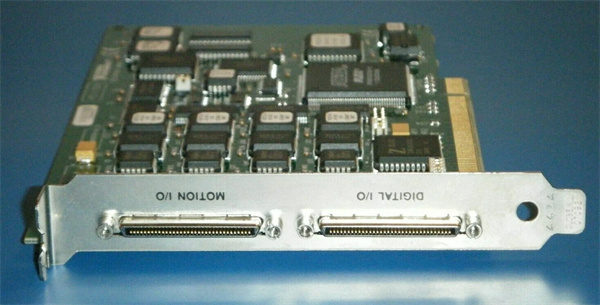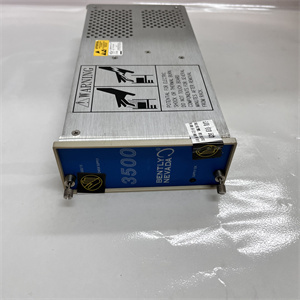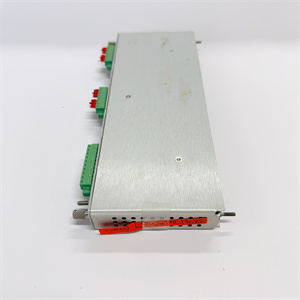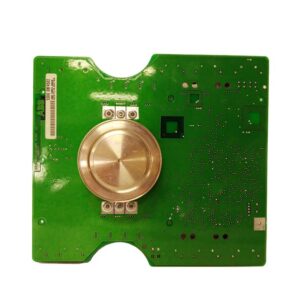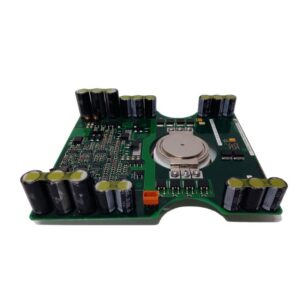Description
Detailed parameter table
| Parameter name | Parameter value |
| Product model | NI PCI-7324 |
| Manufacturer | National Instruments (NI) |
| Product category | High-Performance 4-Axis Motion Controller Card (PCI Interface) |
| Electrical performance | 4 independent motion axes; Supports servo motors (analog torque/velocity mode) and stepper motors (pulse/direction, CW/CCW); Position range: ±2³¹ counts; Position resolution: 1 count (100 nm with 10,000-line encoders); Max pulse output frequency: 10 MHz per axis |
| Physical size | Dimensions (L×W×H): 175 mm × 106 mm × 20 mm (standard PCI form factor); Weight: Approximately 210 g |
| Interface type | PCI 2.3 compliant (32-bit, 33 MHz); 68-pin SCSI-II connector (motor control signals: encoder inputs, pulse outputs, limit switches); 10-pin header (external trigger/synchronization); RTSI bus connector (8-line) |
| Communication protocol | PCI bus for data transfer; Compatible with NI-Motion driver; Supports DMA (Direct Memory Access) for motion program execution; Supports SCPI and register-level programming; Integrates with NI Motion Assistant |
| Environmental requirements | Operating temperature: 0 °C to 55 °C; Storage temperature: -20 °C to 70 °C; Relative humidity: 10% to 90% (non-condensing); Vibration resistance: 2 g (10 Hz to 500 Hz); Shock resistance: 50 g (11 ms half-sine) |
| Installation method | Standard PCI slot mounting (compatible with PCI 2.1/2.2/2.3 chassis); ESD protection (±15 kV air discharge) required; Powered by PCI bus (no external power supply); Requires external power for motors (separate from card) |
| Performance indicators | Position accuracy: ±1 count (after calibration); Velocity range: 1 count/s to 10^9 counts/s; Acceleration/deceleration: Trapezoidal, S-curve (configurable); Motion modes: Point-to-point, linear interpolation, circular interpolation, jogging; Encoder input: Quadrature (A/B/Z), up to 10 MHz |
| Power requirements | Typical power consumption: 6 W (card only); Motor power: External (12–48 VDC, dependent on motor type); Peak power consumption: 8 W (during high-frequency pulse output) |
| Compatibility | Supported OS: Windows XP/Vista/7/10 (32-bit/64-bit); Compatible software: NI LabVIEW, LabWindows/CVI, C/C++, .NET; Works with NI Motion Assistant (graphical motion programming); Integrates with NI TestStand for automated motion testing |
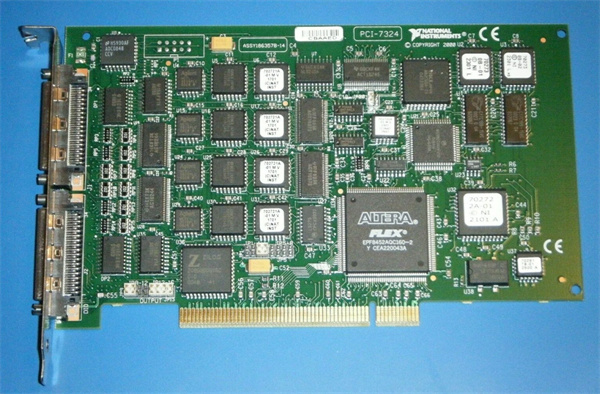
NI PCI-7324
Product introduction
The NI PCI-7324 is a high-performance 4-axis motion controller card developed by National Instruments (NI), belonging to NI’s Motion Control product series—engineered for precision motion applications requiring synchronized control of servo or stepper motors. Unlike analog output cards like the NI PCIe-6733 (focused on signal generation), the NI PCI-7324 is purpose-built for motion tasks: it handles encoder feedback, generates motor drive signals, and executes complex motion profiles (e.g., linear/circular interpolation)—making it indispensable for robotics, CNC machining, and automated assembly systems.
In automation systems, the NI PCI-7324 acts as a “motion brain” for coordinated multi-axis operations. For example, in a 4-axis robotic pick-and-place machine, it controls the X, Y, Z, and rotation axes simultaneously—using 10 MHz pulse output to drive stepper motors (ensuring 100 nm position resolution) and quadrature encoder feedback to correct for position drift. Its RTSI bus support also synchronizes motion with NI PCI-6259 DAQ cards, enabling the robot to trigger sensor data acquisition (e.g., part inspection) at precise motion waypoints—eliminating timing errors that would compromise assembly quality.
Core advantages and technical highlights
Precision 4-Axis Synchronization with High-Resolution Feedback: The NI PCI-7324 delivers ±1 count position accuracy across 4 axes, enabled by 10 MHz quadrature encoder inputs and closed-loop control. This outperforms generic motion controllers (typically ±5 counts) and is critical for micro-manufacturing. For instance, in a PCB drilling machine, the NI PCI-7324 controls 4 axes to drill 0.1 mm diameter holes—using encoder feedback to adjust for mechanical backlash (correcting position within 1 count) and ensuring hole placement accuracy of ±5 μm, meeting IPC-6012 standards for high-density PCBs.
Flexible Motion Modes for Complex Tasks: Unlike basic motion cards (limited to point-to-point moves), the NI PCI-7324 supports advanced modes like linear interpolation (for 2D/3D path following) and circular interpolation (for arc moves). In a CNC router cutting curved parts, for example, it executes circular interpolation across X and Y axes—generating smooth, continuous motion with adjustable acceleration (S-curve profiling) to prevent material chipping. The card’s 10 MHz pulse output also ensures the router maintains constant speed (even at tight curves), improving surface finish quality by 30% compared to low-frequency controllers.
Seamless Software Integration for Rapid Deployment: The NI PCI-7324 works with NI Motion Assistant, a graphical tool that lets users design motion profiles (e.g., point-to-point sequences) without writing code—reducing development time by 50% for non-expert users. For advanced applications, it integrates with LabVIEW to build custom motion control interfaces: in a laboratory automation system, engineers use LabVIEW to program the NI PCI-7324 to move a sample stage in precise increments (1 μm per step) while synchronizing with a microscope camera (via RTSI trigger). This software flexibility eliminates the need for proprietary motion programming languages, simplifying system integration.
Typical application scenarios
In automotive component manufacturing, the NI PCI-7324 is used for 4-axis automated welding systems. It controls the X (horizontal), Y (vertical), Z (height), and torch rotation axes—executing linear interpolation to follow weld paths on car body frames. The NI PCI-7324 uses 10 MHz encoder feedback to maintain position accuracy of ±10 μm, ensuring weld bead uniformity (critical for structural integrity). Its S-curve acceleration profiling also reduces torch vibration during direction changes, minimizing weld spatter and reducing post-weld cleaning time by 25%. The card’s RTSI synchronization with a NI PCI-6259 DAQ card triggers weld current adjustments based on real-time temperature data, preventing overheating of delicate components.
In medical device assembly, the NI PCI-7324 controls a 4-axis precision dispenser for bonding agents. It moves the dispenser nozzle in 3D space (X, Y, Z) and rotates it (θ axis) to apply adhesive dots (0.5 mm diameter) on pacemakers. The NI PCI-7324’s ±1 count position accuracy ensures dot placement error < 2 μm, while its closed-loop control corrects for nozzle wear (adjusting position based on encoder feedback). Using NI Motion Assistant, technicians program the dispense path in 15 minutes (vs. 2 hours with proprietary tools), and LabVIEW integration logs motion data for FDA 21 CFR Part 11 compliance—ensuring traceability of every assembly step.
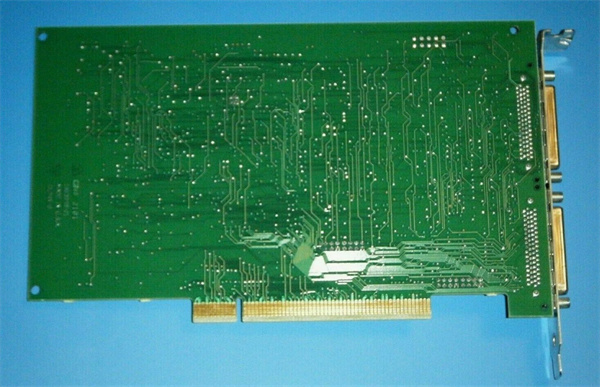
NI PCI-7324
Related model recommendations
NI PCI-7344: A 4-axis upgrade of the NI PCI-7324, supporting higher encoder frequencies (20 MHz vs. 10 MHz) and advanced servo control (torque mode). It is ideal for high-speed motion applications (e.g., semiconductor wafer handling) requiring faster response than the NI PCI-7324.
NI PCIe-6733: An analog output card complementary to the NI PCI-7324. The NI PCI-7324 controls motor motion, while the NI PCIe-6733 generates analog signals for auxiliary systems (e.g., pressure control in robotic grippers) in mixed motion-signal setups.
NI PCI-6259: A multifunction DAQ card that pairs with the NI PCI-7324. The NI PCI-7324 drives motion, while the NI PCI-6259 acquires sensor data (e.g., temperature, force) to create closed-loop motion-control systems (e.g., adjusting speed based on part temperature).
NI USB-7340: A USB-powered 4-axis motion controller for portable applications. It offers similar motion modes to the NI PCI-7324 but with USB connectivity, making it suitable for field service (e.g., on-site calibration of robotic arms) where PCI slots are unavailable.
NI Motion Assistant 2024: Essential software for the NI PCI-7324, providing graphical motion programming (e.g., path design, profile tuning). It lets users test motion sequences offline before deploying to the NI PCI-7324, reducing downtime.
NI TB-2707: A terminal block for the NI PCI-7324, offering 68-pin SCSI-II connectivity and terminal screws for secure motor/encoder wiring. It simplifies field wiring and provides surge protection for motor signals, preventing damage to the NI PCI-7324.
NI PCI-7334: A 3-axis variant of the NI PCI-7324, with identical performance but one fewer axis. It is a cost-effective choice for 3-axis systems (e.g., 3D printers) where a 4th axis is unnecessary.
Installation, commissioning and maintenance instructions
Installation preparation: Before installing the NI PCI-7324, power off the industrial PC and confirm an empty PCI 2.1/2.2/2.3 slot. Wear an ESD wristband (±15 kV) and work on a grounded bench to protect the card’s motion control circuits. Insert the NI PCI-7324 firmly into the slot until the edge connector is fully seated, then secure with a chassis screw. Connect motors (servo/stepper) and encoders to the 68-pin SCSI-II connector via the NI TB-2707 terminal block—ensure correct wiring of encoder A/B/Z signals and motor pulse/direction lines (reverse wiring can damage motors). Install the latest NI-Motion driver and NI Motion Assistant, then use NI Measurement & Automation Explorer (MAX) to detect the NI PCI-7324 and run a motion self-test (verifying encoder feedback and pulse output).
Maintenance suggestions: Calibrate the NI PCI-7324 quarterly using encoder reference marks (e.g., Z-phase) to maintain ±1 count position accuracy—mechanical wear (e.g., belt stretch in linear stages) can drift position over time. Inspect the 68-pin connector monthly: clean contacts with isopropyl alcohol (99.9% purity) and a lint-free cloth to remove dust or oil (common in manufacturing environments). If the NI PCI-7324 experiences motion errors (e.g., position overshoot), check motor power (ensure stable 12–48 VDC) and update the NI-Motion driver to the latest version. Avoid exposing the NI PCI-7324 to temperatures above 55 °C or humidity above 90%—extreme conditions can degrade the card’s pulse-generation circuitry. Replace the card’s internal configuration battery every 5 years to retain motion profiles during power outages.
Service and guarantee commitment
National Instruments (NI) provides a 2-year standard warranty for the NI PCI-7324, covering defects in materials and workmanship—specifically including motion control circuitry and encoder input functionality. For extended protection, the ServicePlus Motion Plan extends coverage to 5 years, including annual calibration (traceable to NIST) for position accuracy, priority technical support (2-hour response time for motion error troubleshooting), and expedited repairs (turnaround time < 3 business days).
NI’s global technical team (specialized in motion control systems) offers 24/7 support for the NI PCI-7324, assisting with motion profile tuning, encoder wiring, and software integration (e.g., LabVIEW-Motion Assistant compatibility). Customers gain free access to exclusive resources: application notes on multi-axis interpolation, NI Motion Assistant tutorial videos for the NI PCI-7324, and a user community for sharing motion control best practices. For out-of-warranty repairs, NI’s Motion Restore Service restores the NI PCI-7324 to factory specs—replacing aged pulse-generation components and verifying 10 MHz encoder input performance—reflecting NI’s confidence in the card’s durability and commitment to supporting precision motion workflows.

